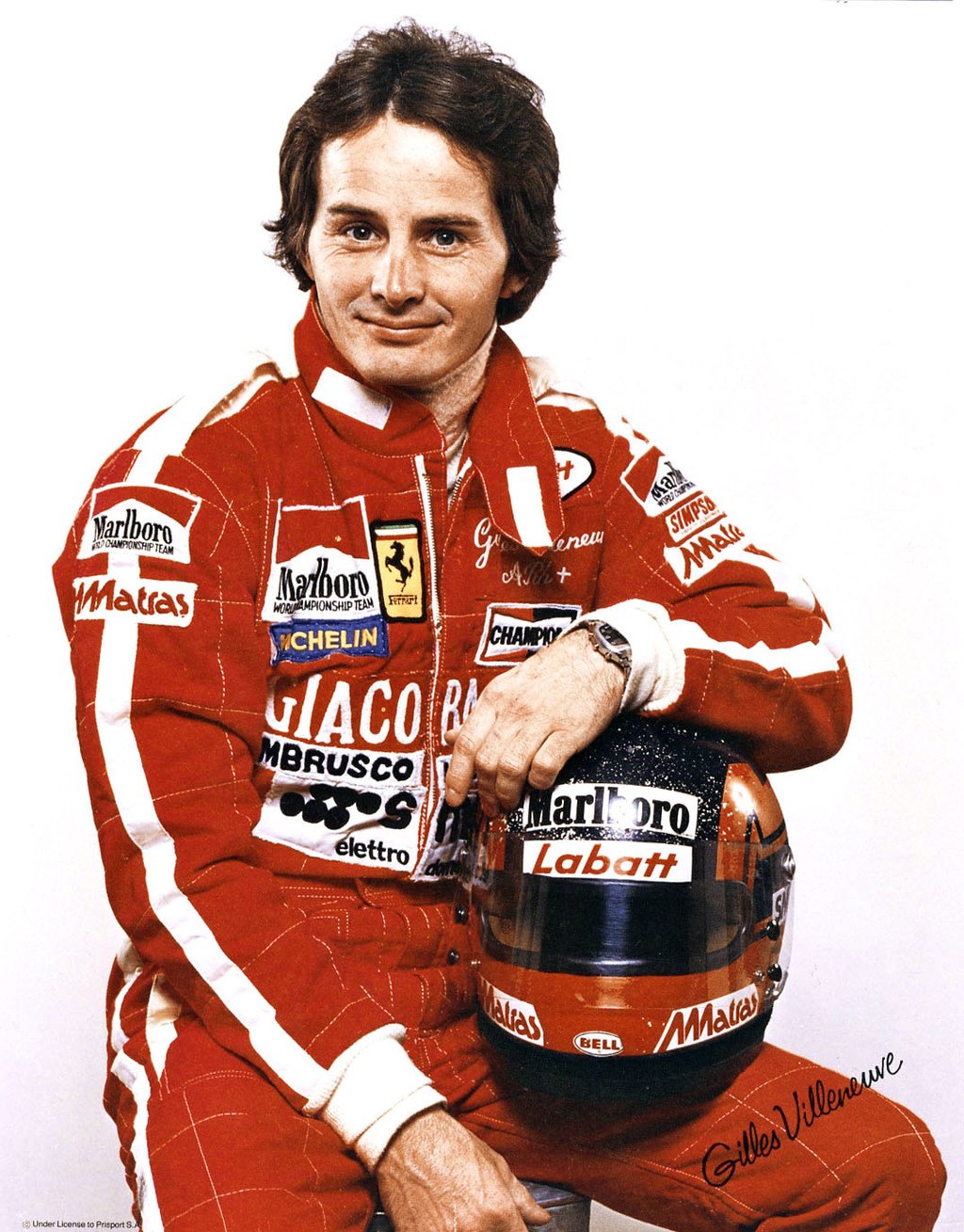Over 28 years ago, on a rainy and cold October day, I was in attendance when Gilles Villeneuve won his first F1 race. To the delight of the cheering crowd, he did it on his home course in Montreal, which would later be renamed in his honor. Thousands upon thousands of spectators were jumping with joy when the checkered flag came down and the red Ferrari 312T3 number 12 was the first to cross the finish line.
The miserable weather didn’t matter anymore. The only thing that counted was Gilles had won.
“Seasoned” Champion
I began following his career when he was racing snowmobiles. He raced Skiroule machines. They had been designed after Bombardier’s success with Ski-doo. Skiroule was eventually sold to the Coleman Company, famous for its camping gear. Gilles became the Snowmobile World Derby champion in 1974.
One summer, he did some drag racing with his Mustang, but going in a straight line bored him. He attended the Jim Russell Racing School to obtain his professional license. Despite driving an older Formula Ford car he purchased after mortgaging his house, much to the dismay of his wife, he won seven out of the ten races he entered. It was enough to win the regional championship in the process.
The following year, he moved to Formula Atlantic. It was raining heavily when he won his first race in 1975. In 1976, he was crowned North American champion by winning all but one race during that season. And the sole race he didn’t win, he came in second. He tried to jump to Formula 2 in Europe, but a contract didn’t materialize, so he returned to Formula Atlantic.
My brother and I used to go see him race on weekends. The two-day spectacle included the preliminary races to Formula Atlantic which showcased the Honda Civic, Formula Ford, TransAm, and Can-Am. Gilles also did some Can-Am races for Wolf Racing.
Finding Home
In 1976, there was a celebrity Formula Atlantic race that included F1 stars. Gilles won the race. In doing so, he impressed James Hunt, one of the participants who would become the F1 champion that year. James Hunt recommended the Formula Atlantic champion to McLaren, for whom he was racing, and it was the beginning of Gilles Formula 1 career. He lied about his age for fear of being considered too old to be an F1 racer.
Although promising at first, things didn’t pan out with McLaren nor with Wolf Racing; the other team that was interested in Gilles for their F1 effort and for whom he had driven Cam-Am cars. Walter Wolf recommended Gilles Villeneuve to Enzo Ferrari. The Commendatore took an immediate liking to Gilles Villeneuve whose stature reminded him of Tazio Nuvolari. Ferdinand Porsche called Nuvolari the greatest driver of the past, the present, and the future. Mr. Ferrari decided to give Gilles a chance and eventually signed him to a contact.
Despite a poor showing in the beginning, problems with the Michelin radial tires, and calls from the Italian press to get rid of him, the Commendatore kept him on Scuderia Ferrari, much to the delight of supporters like me. Mr. Ferrari grew to love Gilles like a son. He said of Gilles, “with Villeneuve, you win, even if you lose.”
Track & Television
My brother and I kept going to the local races after Gilles Villeneuve had made it to F1. Paul Newman was a team owner, then. I’ll never forget an accident during a race when one of his cars plowed head on into a concrete barrier at full speed. Paul Newman stood nearby, anxious. After what felt like an eternity, they extricated the driver from the wreckage. His legs were mangled. We later learned that he had eventually been flown to Switzerland for medical care, but his legs had to be amputated.
We watched Gilles’ races on television too. He was called the wet weather master for a reason. One simply has to watch the start of the 1979 Watkins Glen race to see how he maneuvered on a wet racetrack. He started fourth on the grid and before the first turn he was in first position. He credited his snowmobile racing days for his ability to handle slippery surfaces and driving conditions where visibility was minimal.
Thanks to the web and people who post videos, you can see footage of his racing prowess. Gilles once said he couldn’t hurt himself, but he could hurt the car. That’s how confident he was. Who can forget the duel between René Arnoux in his Renault twin-turbo and Villeneuve in his Ferrari at the 1979 French Grand Prix? It was unbelievable racing. That same year, he was voted fastest F1 driver by his peers who included mechanics and team directors.
Living On
When that fatal day happened in 1982, when he hit a slow car during a practice run, a little piece of us also died. Seeing pictures of him by the fence as track officials try to revive him breaks your heart. He was 32. But sadness gives way to rejoicing for all that he has accomplished – he was voted best Ferrari driver ever by Motor Sport Magazine. His son went on to become Indy (CART) Champion and F1 Champion.
So, with a new F1 season underway, I remember you, Gilles Villeneuve. Thank you for all the excitement you have provided your fans. I’m glad I was able to see you race in person and to be there when you won your first Grand Prix. Your memory lives on.
Michael Bellamy is the author of our Memory Lane series. He enjoys driving his 1997 Lincoln Mark VIII LSC and until an untimely collision claimed it, his 2001 Ford F-150 7700.
Cover Photo: Ferrari S.p.A.
from Automoblog.net http://www.automoblog.net/2017/05/05/memory-lane-remembering-gilles-villeneuve/
via IFTTT
from Tumblr http://peternpalmer.tumblr.com/post/160344217651
via IFTTT


No comments:
Post a Comment